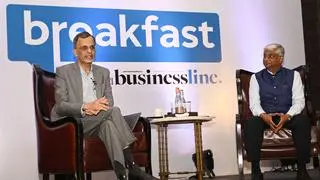Finance Minister Arun Jaitley wants to increase the size of the Union Budget, with big spends. But with demonetisation of ₹500 and ₹1,000 currency notes slowing the economic momentum and global crude prices firming up, his team may be cramped for fiscal space.
Budget 2017-18 is likely to provide a renewed thrust on public spending as the government props up demand and growth. “The idea is to expand the size of the Budget in terms of revenue and expenditure so as to boost economic growth. Public spending will play a large role,” said two officials familiar with the development.
However, the Centre does not plan to deviate from its path of fiscal consolidation and instead hopes to find additional funds, if possible through a higher dividend revenue from the Reserve Bank of India as well as proceeds from disinvestment.
“Crude oil prices are firming up again. But there is expectation of higher revenue receipts from disinvestment and dividend from public sector units as well as the RBI,” said an official.
While RBI Governor Urjit Patel has said the withdrawal of demonetised notes may not a lead to a special dividend to the government, sources said the Centre is exploring options in respect of currency notes that are not deposited back into banks. Officials from the Finance Ministry and the RBI are working on it.
“The government has little option in terms of how to expand public expenditure next fiscal as even in 2016-17 there will be pressure on the deficit from shortfalls in telecom auction and disinvestment proceeds,” said Sunil Sinha, Principal Economist, India Ratings.
The government is also likely to keep a high target for receipts from disinvestment as it plans to go ahead with strategic sale of loss-making public sector units from 2017-18.
In the current fiscal, it has budgeted ₹56,000 crore from disinvestment proceeds, including ₹36,000 crore from strategic sales. “A similar target is likely to be maintained,” said a source.
Analysts have warned that the impact of demonetisation will be felt on the economy in not only the second half of the current fiscal, but also in the next financial year.








Comments
Comments have to be in English, and in full sentences. They cannot be abusive or personal. Please abide by our community guidelines for posting your comments.
We have migrated to a new commenting platform. If you are already a registered user of TheHindu Businessline and logged in, you may continue to engage with our articles. If you do not have an account please register and login to post comments. Users can access their older comments by logging into their accounts on Vuukle.